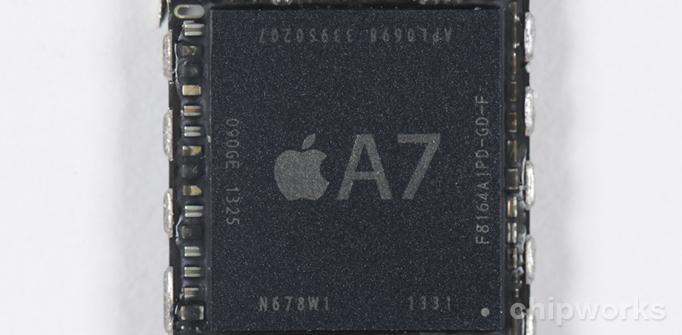Samsung to reportedly share production of Apple's 'A8' SoC with TSMC
A rumor out of the Far East on Sunday claims Apple has once again retained Samsung's services to build a next-generation processor dubbed the "A8," though a majority of production will reportedly be handled by Taiwan Semiconductor Manufacturing Co.
Citing industry sources, The Korea Economic Daily claims Apple has placed an order with Samsung to produce some 30 to 40 percent of a next-gen system-on-chip, dubbed the "A8," iterations of which is expected to power next year's flagship iOS devices. The sources explained difficulties with the advanced 20 nanometer fabrication process have resulted in unacceptable yield rates, prompting Apple to turn to Samsung's foundries.
It was reported in June that TSMC landed a contract to build future A-series SoCs starting next year, spurring speculation that the firm would be the sole provider of Apple's silicon. Rumors of a switch away from Samsung gained traction in April, when a separate report claimed Apple would move to TSMC after its current contract with the Korean company expired.
Further, AppleInsider reported in July that TSMC held a job fair in New York, suggesting the chip maker is planning to open a facility in the area. Apple could feasibly help finance the rumored fab, which could grant access to a dedicated production line.
Samsung has supplied Apple's A-series chips since the first iPhone debuted in 2007, including the A7 chip powering this year's iPhone 5s, as well as other components like RAM modules and device displays. The two companies have since become fierce rivals, however, due in no small part to an ongoing global patent dispute.
Recently, Apple has been actively looking to diversify away from Samsung, but the Korean company is one of the few electronics manufacturers that can produce the advanced components Cupertino needs to for its popular devices. The iPhone maker's attempts lessen its reliance on Samsung have been successful in some areas, however, an example being device displays.
 AppleInsider Staff
AppleInsider Staff











 Mike Wuerthele
Mike Wuerthele
 Malcolm Owen
Malcolm Owen
 Chip Loder
Chip Loder

 William Gallagher
William Gallagher
 Christine McKee
Christine McKee
 Michael Stroup
Michael Stroup
 William Gallagher and Mike Wuerthele
William Gallagher and Mike Wuerthele






